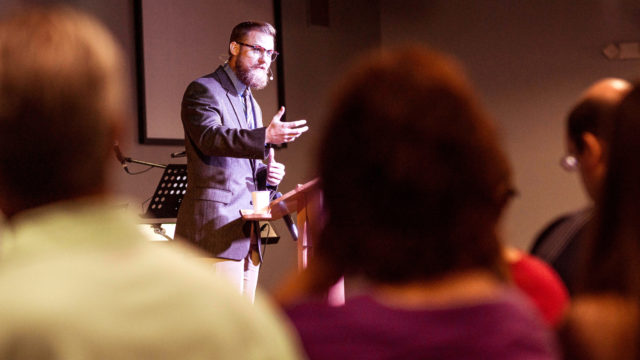Consider Your Ways: Fruitless Prosperity
Haggai 1:3-12
Preached at Main Street Church on November 24th, 2019
The book of Haggai is ultimately about building God’s kingdom. It looks like it’s about rebuilding God’s Temple, but the main idea is that the people of God must restore God’s temple in order to mediate God’s presence in the world and show the world the kingdom of God. The reason the book of Haggai is important to us is because it hits on one of the Bible’s main themes that we see from cover to cover, and that is the Temple. In Scripture the Temple represents the mission of God to fill the earth with his glory.
In Ancient Near Eastern culture a temple was a palace of a god. And, as Goheen said last week, the temple, or the god’s palace, was connected to the palace of the human king, and the god and the human king ruled in the kingdom together, with the human king administering the rule of the god who lived in the temple.
The first place that we see a temple is in Genesis 1 with creation and the Garden of Eden. During the time that Genesis was written, “anyone reading about something being built by a god in six days or stages would know that it was basically a temple, a dwelling for the god himself.” And after completing the temple the god would enter the newly constructed house and ‘rest’ there, taking up residence in his new home. This is exactly what we are told God did after his temple—his dwelling place of creation and the garden of Eden—was completed, he rested on the seventh day; not because he was worn out, but because he was inhabiting his temple.
In addition to this, when a temple was almost complete, an “image of the god himself is inserted into the shrine. This image…is the mode and means of the god’s presence in the house.” And, as we see in Genesis 1-2, on the sixth day God put his image bearers, Adam and Eve, male and female, as his vice-regents who would mediate his rule and his kingdom in the world that he made. Adam and Eve were to represent God’s good rule over all creation. That’s what God meant when he told them to subdue the earth and have dominion over it.
So the Temple of Eden was the place where humans could live with God in his presence, and rule in his kingdom under him. But they rebelled against God’s rule over them, and were kicked out of God’s temple; they lost the blessing of his presence and the curse of sin came on all creation.
The future looked bleak until God appeared to Abram in Genesis 12 and made a covenant with him saying that all the families of the earth would be blessed through him. And Abram built an altar—or a mini temple—and the place where he did this was called Bethel, which means ‘House of God.’ God would mediate the blessing of his presence through Abram.
Ultimately through Abraham came Isaac, then Jacob, then Joseph moved them to Egypt where the descendants of Abraham—in keeping with God’s promise—increased in number, and were called Israelites after Jacob who was called Israel. And once the Israelites were liberated from Egypt, God commanded them to built the tabernacle: A portable temple where he could live in the midst of his people, and through which the presence and rule of God would be mediated through the people of God. With the tabernacle of God in their midst, the people of God would show the world the kingdom of God. In fact, it is in Exodus 19 when God is establishing his covenant with his people that he tells them, “You shall be to me a kingdom of priests” (Ex. 19:6). That meant they were to mediate the presence of God—like priests—by living under the rule of God—as a kingdom.
Eventually, God instituted a human monarchy, starting with Saul and then David followed him, and God promised that through David’s lineage, his kingdom would be established forever. God then used Solomon, David’s son, to build his temple, the place where God’s presence would reside and could be mediated through his people to the surrounding nations. But the people of God were unfaithful to the covenant that God established with them in Exodus, and the prophet Jeremiah foretold that the Jews would be in exile for seventy years, and then Babylon would be punished and Judah would be restored. And that is exactly what happened. The temple that Solomon built was destroyed in about 587 BC by Nebuchadnezzar and the Babylonians, and the Jews lived in exile, having been forced from their homeland and the city of Jerusalem, and the temple—the picture of God’s mission and blessing of his presence—lay in ruins.
So in 1-2 Kings and 1-2 Chronicles you have the historic narrative of these events unfolding, and in the books of Ezra and Nehemiah you have more detail of what was about to unfold. After about fifty years of living as exiles outside of their homeland, Cyrus the Persian conquered the Babylonian empire to an end—just as the prophet Jeremiah had foretold—and he gave permission to the Jews to return to Jerusalem—their homeland—and rebuild the temple.
There are two characters who appear in Haggai: Zerubbabel and Joshua. Zerubbabel was from the lineage of David, and is called the governor of Judah—he was the human king who was to rule under God. Joshua was the high priest who would minister in the temple. So many Jews moved back to Jerusalem to rebuild the temple, but the message that we see in Haggai is that rather than focusing on God’s work and rebuilding the temple, they had spent their time and resources on building their own homes. In other words, they had been neglecting the mission of God in favor of their own pursuits and interests. They were building their own kingdoms instead of the kingdom of God. They were trying to make their own lives comfortable while neglecting the mission of God. So this is what the prophet Haggai said to them:
Haggai 1:3-12 “3 Then the word of the Lord came by the hand of Haggai the prophet, 4 “Is it a time for you yourselves to dwell in your paneled houses, while this house lies in ruins? 5 Now, therefore, thus says the Lord of hosts: Consider your ways. 6 You have sown much, and harvested little. You eat, but you never have enough; you drink, but you never have your fill. You clothe yourselves, but no one is warm. And he who earns wages does so to put them into a bag with holes.
7 “Thus says the Lord of hosts: Consider your ways. 8 Go up to the hills and bring wood and build the house, that I may take pleasure in it and that I may be glorified, says the Lord. 9 You looked for much, and behold, it came to little. And when you brought it home, I blew it away. Why? declares the Lord of hosts. Because of my house that lies in ruins, while each of you busies himself with his own house. 10 Therefore the heavens above you have withheld the dew, and the earth has withheld its produce. 11 And I have called for a drought on the land and the hills, on the grain, the new wine, the oil, on what the ground brings forth, on man and beast, and on all their labors.”
If you try to live your life on your own mission, building your own kingdom, and neglect the mission of God, you will live in perpetual frustration. Even for the Israelites at that time, the problem wasn’t ultimately the neglect of a building, but neglect of what that building represented: the mission of the kingdom of God. Their problem was indifference to the glory of God manifest in the kingdom of God. They were failing to uphold the covenant just as their forefathers did, and in fact, in v. 3-11 Haggai is simple referencing a list of covenant curses from Deuteronomy 29 that God said would come upon his people if they failed to keep covenant with him. Haggai is telling them that they are living in frustration and discontentment because they have neglected the mission of God.
Thanksgiving is a time where we can pause and examine our priorities and consider what is really important to us. As Haggai says in v. 7: “consider your ways.” So here is a very contextualized and paraphrased version of v. 4-6 that I made for us to consider today:
“Is it a time for you to make yourselves comfortable in your subdivisions while the body of Christ suffers division and derision? Now, therefore, thus says the King of Heaven and Earth: Consider your ways. You have found many black Friday deals, but they only make you happy for a moment. Your Thanksgiving meal fills your stomach, but it doesn’t fill your heart, and no amount of drinks can satisfy the deep longing for meaning and connection in your soul. You put on different clothes, but you are still the same on the inside. You are dissatisfied in both your work and your wages. Listen to the God who owns everything and made you: perhaps its time to reconsider what life is really about.”


